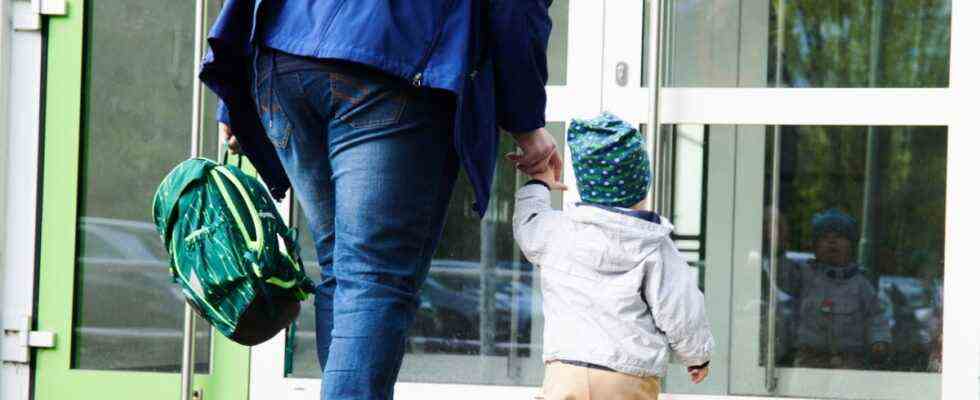Recently there was another moment that surprised Daniel Gromotka. The father of an eight-year-old saw how the Bavarian after-school care centers were already closing corona cases in the groups from a fifth, but only from half in primary school. So some of the same children who were still sitting at the school desk in the morning were no longer allowed to come to the care in the afternoon. There is not enough holistic thinking, says the Munich Parents’ Council. And: “Here the ministry lacks a permanent contact and sparring partner on the parents’ side.”
Although the responsible body, the city and parents have long been sitting together regularly at the table in the state capital, this is not the case in the responsible Ministry of Social Affairs when it comes to the big picture. In order to change that, Gromotka calls for more say for daycare and after-school care parents at state level. The Munich native is the spokesman for a self-confident group that wants to be involved when it comes to daycare fees, inclusion, the Good Daycare Act or Corona rules. Gromotka emphasizes that this is also state policy: “We want to play at that level.” But the government has never really wanted to play along. Too bureaucratic, too expensive and simply superfluous, so the arguments in the past.
Now the state parliament opposition is putting pressure on. The Bayern-Ampel has presented a draft law that is intended to enshrine the participation of parents in law at state level. In concrete terms, parents’ councils in the municipalities should join forces and elect a state parent association (LEV). This should be given the right to be heard in the event of changes in the law and be represented by an office in the Ministry of Social Affairs. In this way, parents should become “from onlookers to team players”, says Johannes Becher (Greens). “Parents know what children need,” says Diana Stachowitz (SPD). There are important issues to discuss, says Julika Sandt (FDP).
So far, parent participation has mostly been on-site
So far, parental involvement in Bavaria has mainly been carried out locally. Every daycare center must set up a parents’ council, as stipulated in the Bavarian Child Education and Care Act. In addition, there are parent councils in Munich, Nuremberg and Olching, which have a say at the local level. The ministry has been resisting the next step – to listen to increasingly demanding parents at state level – for decades.
There are great concerns about creating an expensive bureaucracy monster with high turnover, which will slow down the already tough legislative processes even more. Whereby the Ministry of Social Affairs does not want to give the impression that parents are closed to their opinions. Social Affairs Minister Carolina Trautner (CSU) emphasizes that participation and communication are important guidelines for sustainable politics. However, whether “new, bureaucratic structures” would be expedient must be discussed.
This attitude is “completely backward”, complains Sandt (FDP). The fact is: the Free State is increasingly alone in not having an LEV. In almost all federal states, the parents regularly sit at the round day-care center table alongside representatives of the sponsoring associations. In Baden-Württemberg they worked on the reopening of daycare centers, in Hamburg they lobbied for pool tests and in Schleswig-Holstein they fought for a reduction in daycare costs. LEV has a long tradition there. For more than 15 years, parents have been on committees, have a say in reforms of day-care center financing and help evaluate the effectiveness of new laws. Very positive experiences have been made with this, as a representative of the state reported at a technical discussion in autumn.
For several years there has been a federal parents’ representation of day-care center children from the federal states (Bevki). Bavaria has recently also been represented there with two city councils, which are now building up a state-wide network. The “Geb-Kita-Bayern”, to which Gromotka also belongs, sees a deficit in participation. In the Bavarian Ministry of Social Affairs, however, the disputed actors with their request met with rather little approval.
The ministry prefers to rely on surveys and an expert
In the past, the focus here was less on elected representatives than on polls and Horst Helmut Fleck. The 81-year-old from Ottobrunn (Munich district) has been involved in the Bavarian day-care center landscape for most of his life, going in and out of the ministry until recently. It was 47 years ago, he says on the phone, that he was annoyed about a fee increase of 30 marks and was promptly elected to the parents’ council. He founded the “Working Group of Parents’ Associations of Bavarian Day-Care Facilities” (ABK), worked on key laws – and was repeatedly cited by the ministry until recently when it came to the question of the extent to which day-care center parents were consulted. His critics see it as a “one-man show” without legitimacy, and his website has long been offline.
On the other hand, a day care center app from the Ministry of Social Affairs is to go online this year. The Bavarian parents should be able to network and participate in the low-threshold. In view of the diverse daycare landscape, this digital, location-independent approach seems more promising, says Trautner. The Bayern traffic light only puts it in a further attacking mood. Becher (Greens) speaks of an “alibi participation”, Stachowitz (SPD) of “hypocritical small-small”, Sandt (FDP) of a “pseudo-tool to channel something”. Striking words that are likely to fall again on Tuesday: Then the draft law will be dealt with in the first reading in the state parliament.

